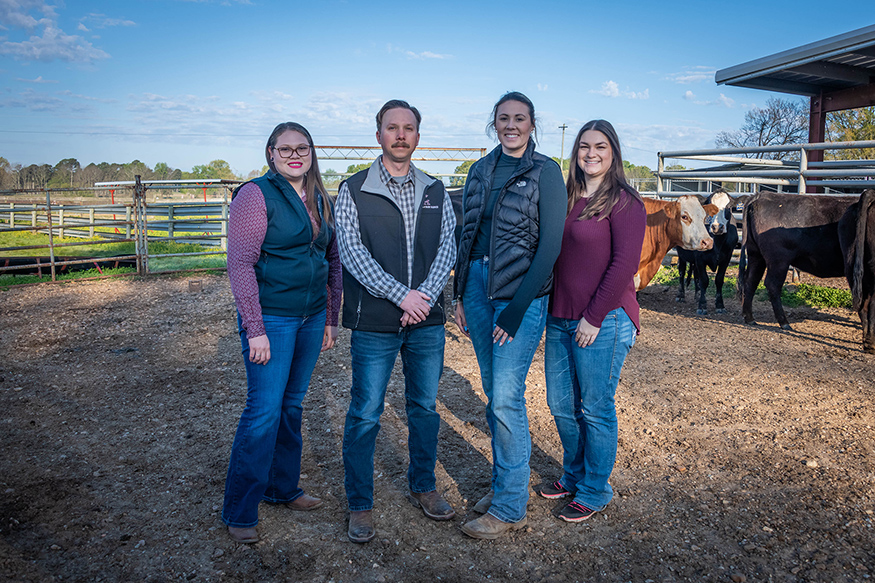Not Just for Sleep: Melatonin awakens MSU scientists to its health benefits for cattle

Contact: Meg Henderson
STARKVILLE, Miss.—Those needing extra sleep often reach for the bottle of melatonin, but Mississippi State scientists are discovering a host of other proven and potential health benefits for cattle who receive the supplement.
MSU faculty and students in the Department of Animal and Dairy Sciences and the Mississippi Agricultural and Forestry Experiment Station are making intriguing discoveries about the functions of melatonin in the bovine body and how this hormone can help support cattle health.
MSU Associate Professor Caleb Lemley has an extensive history of studying the use of melatonin as a supplement in cattle. He has been studying how the hormone affects blood flow between dam and fetus during gestation for nearly a decade.
“Over the years, we’ve looked at melatonin’s antioxidant benefits, which help alleviate oxidative stress in the animals and have implications on their cardiovascular health,” said Lemley.
“Summer heat is a major stressor for cattle, and in our research here at Mississippi State, we’ve found that melatonin can potentially be used to control the animal’s body temperature,” added Postdoctoral Associate Zully Contreras-Correa. “At night, when melatonin levels are highest, body temperature is lowest. Our recent research showed that melatonin supplementation during summertime reduced body temperature in pregnant cattle, so we hope to research it further in other livestock species.”
Because melatonin controls a body’s circadian rhythm and responds to light, levels also fluctuate throughout the year, being naturally higher in the winter and lower in the summer.
“We just completed a study comparing melatonin supplements given to cattle living in Montana to our cattle at MSU over the winter months, and the differences were notable,” said Lemley. “We saw a very limited response in the Montana cattle compared to the Mississippi cattle, so we believe these treatments may be more effective in the Southeast.”
Doctoral students Riley Messman and Rebecca Swanson also are involved with melatonin research.
The scientists recently published a literature review in the journal Biomolecules titled “Melatonin in Health and Disease: A Perspective for Livestock Production.” These scientists examined over 100 studies spanning six decades to show that this hormone—naturally produced in the brain—acts in ways that extend far beyond its basic function of regulating circadian rhythm.
One of the latest discoveries about melatonin is its effects on the microbiome, bacterial communities that live inside the body. In her graduate studies, Messman conducted research looking at its impact on the microbiome in the bovine vaginal tract.
“As melatonin levels fluctuate throughout the day and throughout the year, so do bacterial populations,” said Messman. “So, melatonin is altering the microbiome and the immune system, which plays a role in pretty much every physiological process you could think of.”
As part of her graduate work, Swanson has researched melatonin’s role in skeletal muscle growth.
“Nutrient restriction naturally occurs in specific areas of the United States and at certain times of the year,” she said. “Melatonin can help alleviate some of that nutrient restriction and promote the production of amino acids and more efficient muscle growth.”
Because melatonin is considered a supplement and is not approved by the Food and Drug Administration, there has been a limited amount of research on its full effects and potential benefits. And while it’s currently a legal supplement for show animals, food animals may not legally receive melatonin supplementation. Lemley emphasized it is unlikely that traces of the supplement would be present in the muscle tissue at the time of processing.
“Melatonin has a rapid rate of clearance and will leave the body within a day,” he said. “When you consider that and the low cost of supplementing the cattle at 25 cents a day, there are a lot of potential benefits for producers.”
There is much yet to discover about the far-reaching ways that melatonin can support the health of cattle by simply manipulating the levels of this naturally present hormone through supplementation. MSU scientists will continue their work to further discoveries about its benefits.
This work was supported by the Agriculture and Food Research Initiative competitive grant from the U.S. Department of Agriculture National Institute of Food and Agriculture. Additional funding was provided by the U.S. Department of Agriculture, Agricultural Research Service.
For more information on MSU’s Department of Animal and Dairy Sciences, visit www.ads.msstate.edu. For more about MAFES, visit www.mafes.msstate.edu.
MSU is taking care of what matters. Learn more at www.msstate.edu.